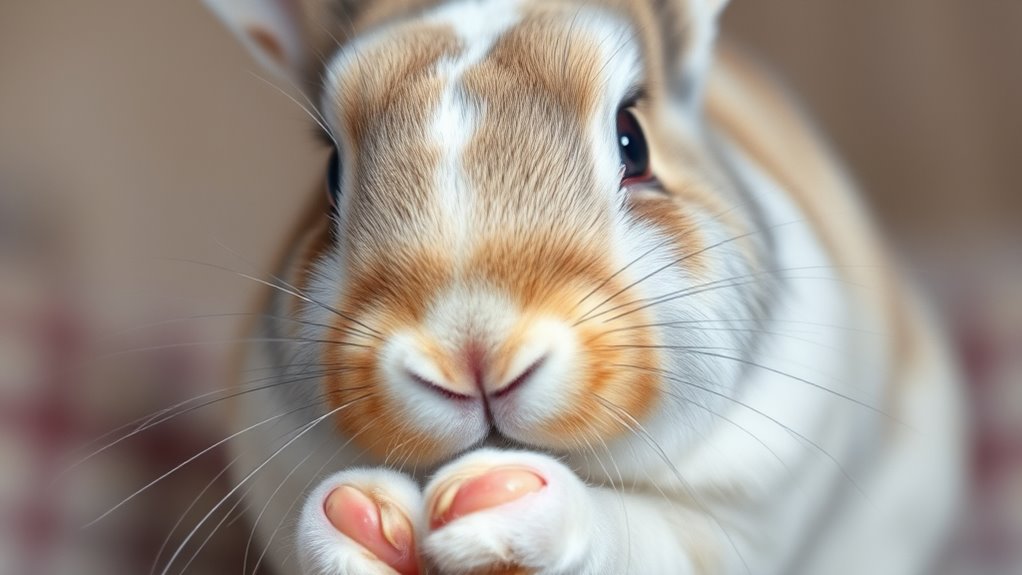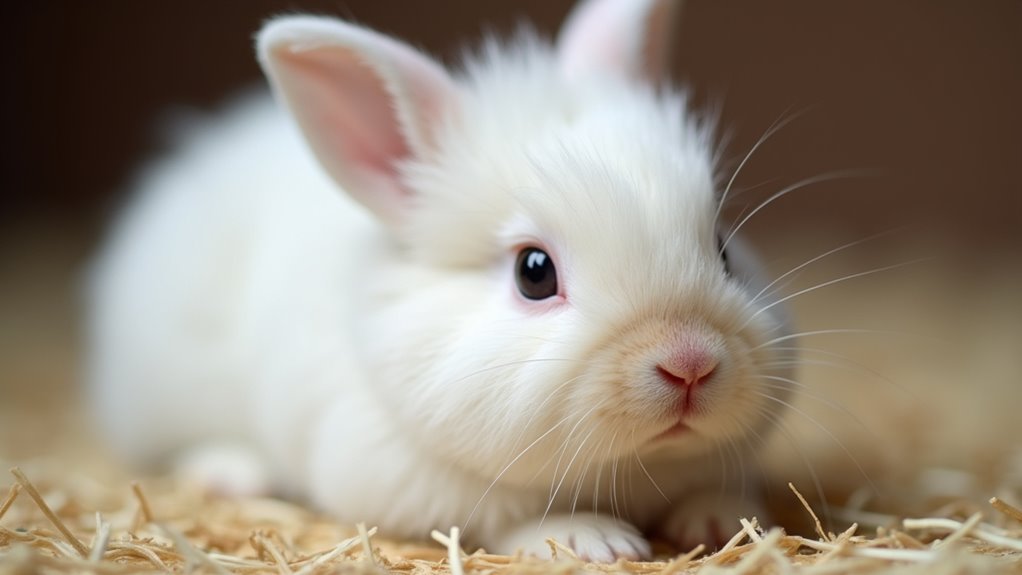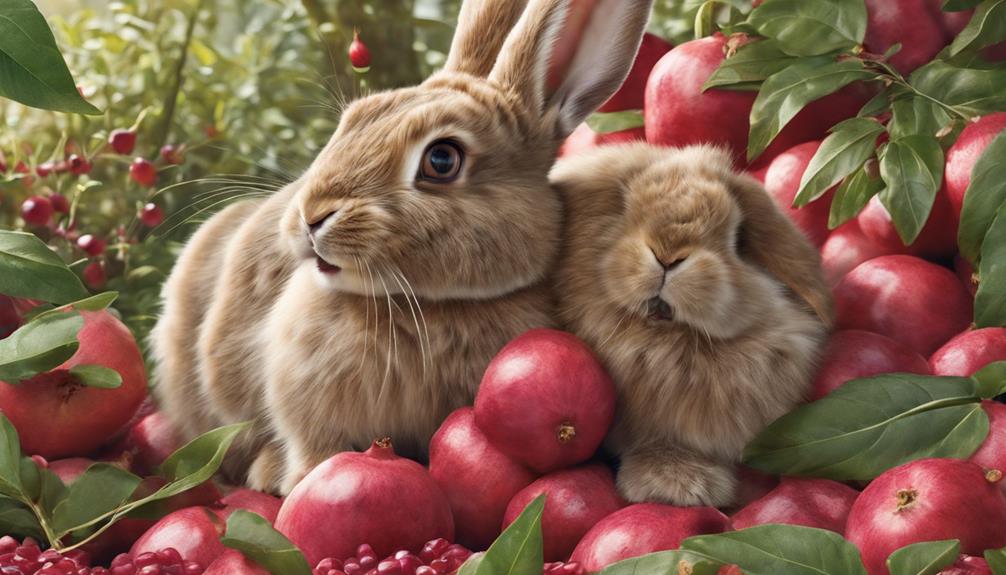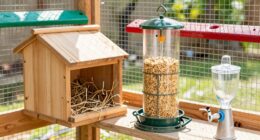To keep your rabbit healthy, watch for common signs of illness like lethargy, decreased appetite, diarrhea, or difficulty breathing. Changes in behavior or stool, or a dull coat, could signal health issues. Regular grooming, a balanced diet, and fresh water help prevent problems. Staying alert to subtle signs early makes a big difference, so pay close attention to your rabbit’s habits and condition. Keep exploring, and you’ll discover more ways to protect your furry friend’s well-being.
Key Takeaways
- Monitor for appetite loss, lethargy, or behavioral changes as early signs of illness.
- Watch for abnormal stool, diarrhea, or difficulty urinating to identify health issues promptly.
- Check for physical symptoms like sneezing, nasal discharge, or labored breathing indicating respiratory problems.
- Observe grooming habits, coat condition, and skin for signs of parasites, infections, or injuries.
- Regular veterinary checkups and prompt attention to unusual signs ensure early detection and treatment.

Whether you’re a new rabbit owner or a seasoned enthusiast, understanding your bunny’s health is essential for their well-being. One of the most important aspects to focus on is maintaining a proper diet management plan. A balanced diet keeps your rabbit healthy, energetic, and less prone to illnesses. Ensure they have unlimited access to fresh hay, which should make up the majority of their diet. Hay promotes healthy digestion and helps wear down their teeth naturally. Supplement this with fresh vegetables like leafy greens, but avoid overfeeding sugary or starchy treats that can upset their digestive system. Providing a consistent supply of clean, fresh water is also crucial for hydration and overall health. Pay attention to your rabbit’s eating habits—any sudden change in appetite might be a sign of underlying health issues, so don’t ignore it.
In addition to diet management, grooming routines play a vital role in maintaining your rabbit’s health. Regular grooming helps prevent matting, reduces the risk of skin infections, and allows you to check for abnormalities such as lumps, wounds, or parasites. For long-haired breeds, daily brushing is necessary to keep their fur free of tangles. Short-haired rabbits still benefit from routine grooming to remove loose fur and dirt and to promote good circulation. Use gentle brushes designed for rabbits and be careful around sensitive areas like the ears and paws. During grooming sessions, take the opportunity to check their nails—trim them regularly to avoid overgrowth and discomfort. Keep an eye on their ears, eyes, and teeth as well; any redness, discharge, or overgrowth can indicate health problems requiring prompt veterinary attention.
Beyond diet management and grooming routines, observing your rabbit closely each day helps you spot early signs of illness. Look for changes in behavior, such as lethargy or aggression, or physical signs like diarrhea, difficulty breathing, or changes in stool. A healthy rabbit maintains a steady weight, has bright eyes, and is generally active and curious. If you notice any anomalies, consult a veterinarian experienced with rabbits immediately. Early detection and intervention can prevent minor issues from escalating into serious health problems. Remember, your rabbit’s well-being depends on your attentive care, including consistent diet management and grooming routines, which together create a strong foundation for a happy, healthy life.
Frequently Asked Questions
How Often Should I Take My Rabbit for Veterinary Check-Ups?
You should take your rabbit for veterinary check-ups at least once a year, especially if you’re concerned about rabbit grooming or outdoor safety. Regular visits help catch health issues early and make certain their environment remains safe. During check-ups, your vet can advise on grooming routines and outdoor safety tips. If your rabbit shows signs of illness or stress, schedule a visit sooner. Consistent care keeps your rabbit happy and healthy.
Can Diet Changes Prevent Common Rabbit Illnesses?
Imagine a rabbit prone to gastrointestinal issues; a diet modification emphasizing high-fiber hay and fresh vegetables can markedly improve its health. Yes, diet changes can prevent common rabbit illnesses by ensuring nutritional balance. Providing a well-rounded diet supports digestion and boosts immunity. You can proactively reduce health risks by maintaining a consistent, nutritious diet, helping your rabbit stay healthy and happy long-term.
What Are Early Signs of Dental Problems in Rabbits?
You should watch for early signs of dental problems like tooth decay and gum inflammation in your rabbit. Look for drooling, difficulty eating, or dropping food. If your rabbit’s gums look red or swollen, or if they avoid hard foods, these could be signs of discomfort. Catching these symptoms early helps prevent more serious issues, so regularly check their teeth and gums for any unusual changes.
How Can I Reduce My Rabbit’S Stress Levels?
Imagine you’re in a quiet, cozy corner of a bustling city—your rabbit needs that same sense of calm. To reduce your rabbit’s stress, try stress reduction techniques like gentle handling and a consistent routine. Environmental enrichment, such as toys and hiding spots, keeps them mentally stimulated and relaxed. Minimize loud noises, keep their space clean, and guarantee plenty of safe time outside the cage to foster comfort and reduce anxiety.
Are There Natural Remedies for Rabbit Health Issues?
You’re wondering if natural remedies can help your rabbit’s health issues. Herbal remedies and nutritional supplements may support their well-being, but always consult your vet first. Herbs like chamomile or lavender can help reduce stress, while supplements such as probiotics promote digestive health. Remember, natural remedies are supplements, not cures, so use them alongside proper veterinary care to keep your rabbit healthy and happy.
Conclusion
By staying vigilant and recognizing the signs of common rabbit illnesses, you can keep your furry friend healthy and happy. Regular check-ups and a keen eye for changes are your best tools—think of yourself as a modern-day veterinarian in your own home. Remember, caring for your rabbit isn’t just about avoiding the plague of old; it’s about creating a safe haven where they can thrive, just like in the good old days of gentle companionship.










